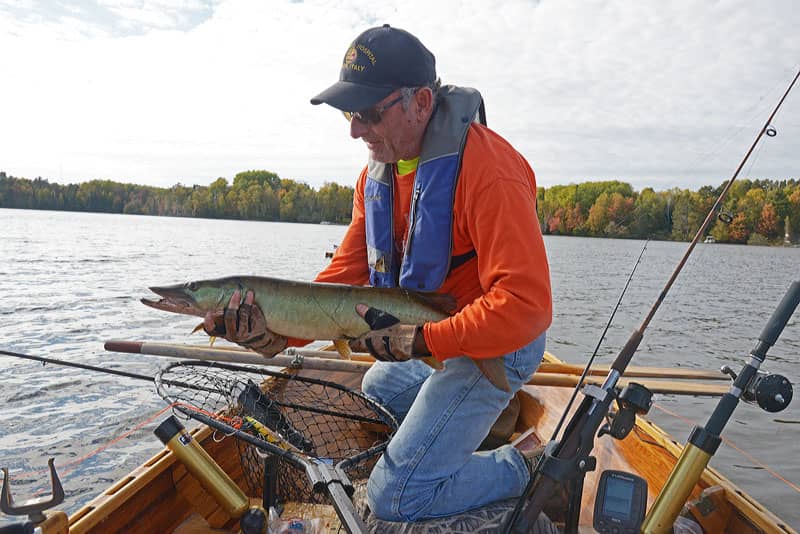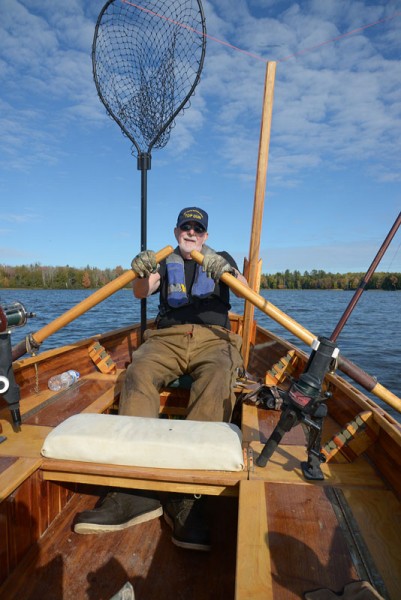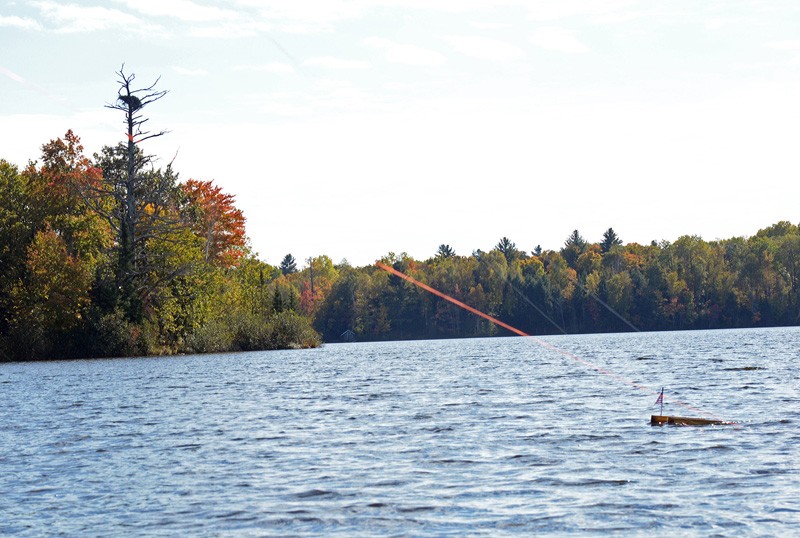Miracles Happen: Fishing Friends Land First Muskie
Patrick Durkin 12.03.15

Tom Heberlein and I didn’t pack our gear to go muskie fishing on an October Monday afternoon in rural Wisconsin until we finished our work obligations around his “Old Tamarack” shack and 40 acres of forest.
As Heberlein said the previous morning when I arrived, we first had to honor the Protestant work ethic, which holds that one cannot play until completing one’s assigned labors—even if one is neither Protestant nor assigned specific jobs.
I seldom make work assignments easy for Heberlein because I just show up at his Ashland County shack when free for a day or two. I then outline the jobs I deem necessary to prepare Old T for November’s gun deer season, and he tells me which work he deems necessary for his solitary stay in the weeks ahead.
We then agree on priorities and a rough schedule for the next 30 hours. Sometimes we even check the weather forecast to see if nature agrees, too. If it doesn’t, we cheat on the fieldwork and juggle the schedule to make time for fishing or a Heberlein grouse hunt.
During my most recent visit, we agreed to first split pine and spruce for quick fires in his woodstove before breaking for lunch. I’d then spend the rest of the day clearing deadfalls and windfalls from his walking trails with my chainsaw. I’d finish the job the next morning, and then we’d hunt muskies after lunch.
We had our plan.
Neither of us, however, is a serious muskie fisherman. In fact, Heberlein suspects he doesn’t really like fishing. Even so, we usually make time each autumn to go row-trolling in my cedar-strip boat, if only to extend my boat’s nearly 10-year-old streak of never landing a muskie. I guess we enjoy rowing my boat, forever wondering if the muskie gods hate us, or if we’re just unlucky, incompetent, or both.
So it was we found ourselves bouncing westward down the Conley Road in my pickup about 1 p.m. that Monday, admiring stands of old hemlocks, and agreeing fall colors on the oaks, aspens, and maples weren’t yet peaking.
“The leaves are kind of between their summer and fall colors,” Heberlein said. “They look like those paintings by French artists, the Impressionists. You know, the ones who mixed their colors for an overall effect instead of painting exact details.”
I nodded as if I knew what the heck he was talking about, and asked him to continue, thinking I might learn something to impress my wife.
“Sorry,” he replied. “That’s all I know about the French Impressionists.”
A cool, light breeze and cloudy skies greeted us when we reached our chosen lake, so Heberlein began adding clothing layers while I prepped my boat for row-trolling.

“What’s that?” Heberlein asked skeptically as I moved my homemade row-trolling mast and matching strip-built skis from the truck to the boat.
“Prepare to be impressed,” I replied. “We’ll run six lures instead of just three or four.”
About a half-hour later we had three lures deployed on each side of the boat, spaced evenly between us and the trolling skis. The skis planed parallel to us as we pulled on our oars from the boat’s fore and aft seats. I suggested we troll up the lake’s western shoreline, circle its northern end, and then troll our way back along the eastern shoreline.
Heberlein suspiciously eyed the carefully-aligned rods, braided fishing lines, and the two skis’ orange tow lines. I sensed a scowl when he asked, “What do we do if we hook a fish?”
I tried to sound confident when replying. “Well, when I fish for salmon with trolling skis on Lake Michigan, one of us grabs the rod that hooked the fish, and the other guy clears the two inside rods so they’re out of the way.”
“OK, but then how do we net it?”
“We’ll bring it alongside the boat so we’re within easy reach of each other.”
Heberlein still seemed skeptical, which seemed fair. After all, we had never run six lines before, and the boat itself was a muskie-fishing virgin.
“Well, that’s how it works, in theory,” I conceded. “The fish might have different ideas, so we’ll just respond as best we can. If we lose the fish, we lose the fish.”
About 10 minutes later, a fish hit the middle line on the boat’s starboard side. Almost instantly, the fish’s ideas differed from mine, causing us to ditch my plan.

First, the fish didn’t break the rubber-band release from the ski’s tow line, which pulled the heavy orange cord into a long “V” between the boat and the ski. Then the fish blasted from the water, its vertical-striped sides flashing in the afternoon sun.
A muskie! Our good fortune stunned us for a second, and then I grabbed the rod and started fighting the fish. We shouted excitedly as the muskie leaped, splashed and dug in its heels. Then it shot like a torpedo over the top and back under the ski’s tow line. The line’s extra weight and ski dragged heavily on the muskie, tiring it out within another minute or so.
I then reeled it in alongside, Heberlein dipped the net, and we lifted the muskie triumphantly into the boat. We estimated its length at about 32 inches, well short of the lake’s 40-inch limit, as I removed treble hooks from its maw. Meanwhile, Heberlein snapped a couple of photos, and I released it seconds later.
I was so giddy from the fight and commotion that I took pleasure in patiently untangling the lines and lures the muskie left in its wake. When we finally resumed rowing after retying and resetting the lines, I gave Heberlein my assessment:
“This is a great way to run six lures, as long as we don’t actually hook a fish, snag a log, or drag everything through shallow weed beds. We’ll need to work at this a few times to learn its tricks and best practices.”
As often as Heberlein and I go muskie fishing, it will take more than a strong Protestant work ethic to become experts anytime soon. But we’ll have fun playing the part.

